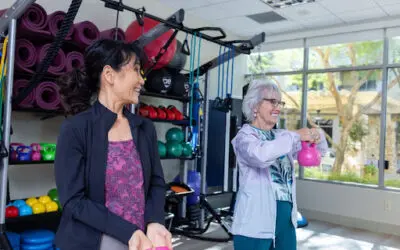Aquatic exercises are beneficial for people of all ages, and are particularly good for older adults because exercising in water has little impact on the joints. In water, the weight of the body can be reduced by up to 90% depending on the water’s depth, which makes swimming and other types of aquatic exercises ideal for those with age-related hip, knee or shoulder issues or arthritis. Of course, the benefits of exercising in the pool extend beyond being good for our joints.
Aquatic exercise has cardiovascular benefits, too, depending on the type of exercises you choose to do. And this makes pool workouts not only great for the heart, but also for the waistline.
Every resident can benefit from exercises in the pool. It’s a great addition to an already established exercise regimen and especially helpful for anyone who is rehabilitating or recovering from surgery or an injury.
The next time you’re ready to exercise, consider leaving the gym shoes in the closet and taking a dip instead. Below are just some of the benefits you’ll get when you work out in the water.
Increased Metabolism.
Water-based activities have a myriad of health benefits for older adults, including increased metabolism. This increase in metabolism can help seniors keep weight gain at bay, lessening your chances of developing diabetes, heart disease and other weight-related illnesses and obesity. Water has greater resistance than air, which means walking in water requires more effort and ultimately burns more calories than walking on land.
Decreased Joint Impact.
As already mentioned, aquatic exercise is excellent for maintaining the health of your joints and can help rehabilitate joints after surgery or injury. For seniors, high-impact exercises such as running or aerobics can be taxing on the joints, but exercises in the water can offer the same benefits as a good run.
Water supports much of your body’s weight, thus reducing the load on your joints. In addition, the weight of the water will prevent you from moving your joints too quickly, thereby reducing the risk of repetitive-stress injuries.
Stronger Muscles – and Bones.
A recent study of post-menopausal women found that after exercising in water for six months, they increased their muscle strength and bone density and decreased their amount of falls by 86 percent. As the risk of osteoporosis increases, seniors need to find ways to keep their bones strong, and aquatic exercise may be key.
Improved Mental Health.
Research has shown that seniors who exercise regularly are less likely to suffer from depression. And physical activity helps slow mental decline and keep the brain and memory sharp. In fact, all exercise increases blood flow throughout the body and the brain to stimulate cell growth, and help to guard against dementia and Alzheimer’s disease. Plus, floating in water has been linked to decreased stress levels and better relaxation, so spending time in the pool is good for anxiety, too.
Ready to get started?
Try water walking. This simple exercise can be performed in the shallow end of the pool. Hold on to the edge of the pool and wear water shoes for extra traction. As you build strength consider adding hand weights or even weighted boots to burn more calories.
Next time you or a loved one wants to bring variety to your workout, consider the aquatic options above and enjoy strength and stability for years to come!



